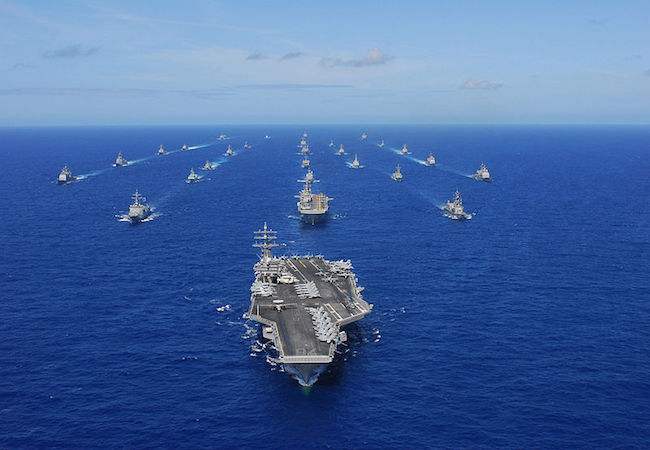
Russia, China, Ukraine, the European Union, the United Kingdom including Northern Ireland, the defense budget, climate change, Iran, Afghanistan, Poland, Hungary, India Iraq, Taiwan, Japan, Cuba are all items that have surfaced in the press as reporters ponder on the issues that President-elect Joe Biden will confront in his foreign policy. It seems every one has forgotten the important Law of the Sea treaty that remains unratified by the US. The last we heard about it was when Secretary of State Hillary Clinton, flanked by the senior brass from the military, announced that the Obama Administration was immediately going to push Congress to vote for its long delayed ratification. It didn’t get enough Senate votes and it’s time overdue to try again. (In fact, under Pentagon prodding the US does follow the rules of the treaty even without signing.)
All the roadblocks of the last thirty years since President Reagan decided to torpedo the treaty have been removed apart from one obstacle- an approving vote in the Senate. If passed it will be a momentous step forward for international law, one which defeated a willing Bill Clinton- the last president who really tried.
Until the Law of the Sea was drafted the seas and oceans around us, two thirds of our planet, were largely lawless. When 350 years ago the Dutch jurist, Hugo Grotius, formulated the doctrine of the freedom of the seas, letting things be seemed a magnificent idea – “Let no man possess what belongs to every man.”
But this is the age of giant tankers, oil spills that destroy whole coasts, declining fish catches, disputes over rights of passage and maybe the beginnings of a gold rush for minerals and genetic resources on the bottom of the sea.
After 26 years of negotiation in which America played an active part, the Law of the Sea came into force twenty six years ago – even without the US enough states ratified it for it to become operational. It was an historic milestone in the annals of nation state competition and commercial exploration.
It gave the world a chance to arrange for mankind a fair distribution of its common patrimony of the seas. It has the chance of establishing precedents that could be applied to other endeavors like the slicing up of oil-rich Antarctica and Arctic Ocean, currently being disputed by nations as diverse as Denmark and Russia, and also the future frontiers of the moon, the planets and outer space. This is why some say it is, in its own way, a Magna Carta for the 21st century. It was a Republican president, Richard Nixon, who first described the seas as “the common heritage of mankind”.
President Harry Truman was the first US president to challenge the conventional wisdom then reigning as laid down by Grotius. In 1945 he proclaimed US jurisdiction over the seabed resources of the continental shelf. Three years later, Chile, Peru and Ecuador raised the stakes by claiming 20-mile maritime zones and seizing American tuna boats fishing in their waters. The fear was that nations might go further and declare exclusive 200-mile territorial waters.
It was in an attempt to find some accommodation among these new coastal jurisdictions and traditional high seas freedom that the Law of the Sea conference was convened. The result was one of the great negotiating texts of all time- far more comprehensive, detailed and demanding of shared sovereignty than that for the International Criminal Court. It weighs the interests of continental nations like the U.S. and Russia, islands like Sri Lanka, the UK and Jamaica, coastal states like Tanzania, and landlocked states such as Austria, Ukraine and Chad.
The treaty rolls back existing claims of territorial jurisdiction wider than 12 miles. It writes into international law the right to free and unimpeded passage through the 100 straits that are narrower than 24 miles. (This is one reason why the Pentagon has long been firmly on the side of the treaty following a series of disputes including one with good neighbor, Canada, over the North West Passage, now steadily becoming ice-free.) The treaty, while recognizing exclusive 200-mile economic zones for coastal states, does not allow them to restrict the passage of ships or the over-flight of planes of other nations.
Once the US ratifies the treaty the pressure will be on the handful of other dissenting states to ratify and, more important, for China to take its responsibilities under the treaty more seriously. China, despite its nervousness about recognizing a treaty that would give the US navy the undisputed right to patrol the Taiwan Strait, has ratified it but has also ignored it in the South China Sea. Russia ratified it in 1997 and has faithfully followed it, even in the contested Arctic waters.
More the pity that the Law of the Sea does not address territorial disputes that were under way before it was negotiated – like who controls the South China Sea’s Spratly Islands that pits China against Vietnam, Taiwan, and the Philippines.
In the first six months of this new Administration America needs to ratify the treaty if China is ever to be shamed into compromises. At the moment when America makes a fuss about China claiming offshore islands in the South China Sea it looks totally hypocritical. It is certainly counterproductive.




